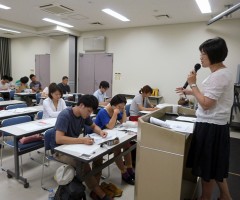Japanese, Taiwanese and South Korean researchers to create shared teaching materials

Yang Su-hsia (right) gave a lecture to students of University of the Ryukyus at the campus in Nishihara on June 27.
July 10, 2013 Yuki Nakasone of Ryukyu Shimpo
The Senkaku Islands and Liancourt Rocks disputes have been attracting international attention. Japanese, South Korean and Taiwanese researchers have launched a project to create common teaching materials on the topic of maritime territorial disputes. The materials are for junior high school students. The researchers propose that we look at national borders from the viewpoint of ordinary citizens and their livelihoods. The project aims to encourage the younger generation to share an understanding of history with their counterparts in these countries and districts by using the teaching materials in schools. Peaceful coexistence is the goal.
The researchers started lectures for college and university students this March in which they considered shared teaching materials. Taking on board ideas from the students, the researchers have tried to overcome differences of opinions across borders.
University of the Ryukyus Associate Professor Takeshi Yamaguchi, Konkuk University Associate Professor Park Sam Hun and Southern Taiwan University of Technology Associate Professor Yang Su-hsia are working on the project. They want to expand it in future to also reflect the Chinese standpoint.
The researchers deliver lectures for college and university students in the three countries and districts. They explain the different ways that textbooks in these countries and districts describe the territorial disputes and how the people react to “territory inherent to” their countries and districts. They reiterate the importance of discussing issues as global citizens who think beyond national borders.
Some students in the countries and districts involved suggested that ongoing exchange and discussion is important in order to resolve disputes. Others said that people in each of the countries and districts should try to reach agreement after they sufficiently understand each other’s position based on historical and objective judgment. Some said the governments should assert their ownership more strongly.
The researchers held an open study session at Okinawa Christian University on June 26 in which they introduced the content of the lectures and reported upon their research results.
Yang said, “Taiwanese people cannot understand the reality of the dispute just from their textbooks. Their government and media influence how people perceive the Senkaku Islands issue.”
Park stressed the importance of discussion across borders, saying, “Politicians in crisis use territorial disputes to manipulate us citizens.”
Yamaguchi said, “From junior high school age, children should learn how people view history and territory contributes to peaceful coexistence and learn how to settle disputes.”
The Asia Peace and History Research Institute of South Korea supports the project with assistance from the Northeast Asian History Foundation.
(English translation by T&CT, Mark Ealey)
Previous Article:Oceanographer Muzik confirms the importance of Henoko Coast
Next Article:Young generation launches new peace organization
[Similar Articles]
- Learn Okinawan dialect in English
- Researchers to establish a new association to request return of Ryukyuan remains
- Chinese classic documents from the Ryukyu Kingdom era published
- Uchinaguchi class of the Okinawa Association of America marks its 9th anniversary
- OPG publishes book to help elementary and junior high students learn Shimakutuba
 Webcam(Kokusai Street)
Webcam(Kokusai Street)


